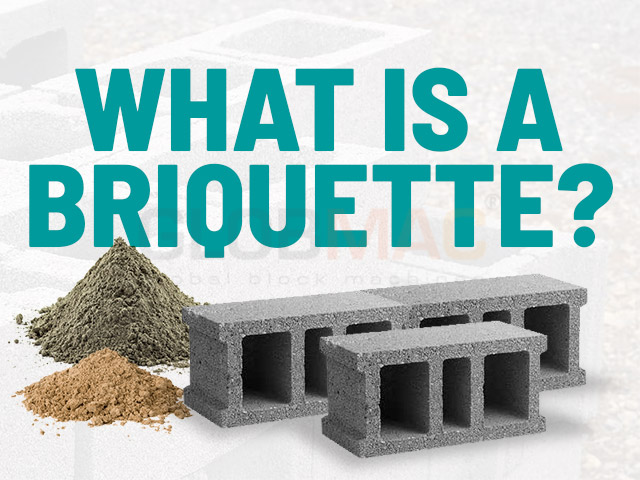
What is a briquette? A briquette is a mortar obtained by combining sand and cement or a compacted block of aggregate including mortar.
What is a Briquette? Contents of the Briquette
First thing that comes to mind about “What is a briquette?” is that thanks to its completely natural aggregate in its structure, it does not have a harmful effect on the environment and also is atmosphere-friendly.
In briquette preparation,
- Coal,
- Wood coal,
- Sand,
- Cement, and so on
are used as raw materials. Substances like coal and charcoal take part in the special processes which is a single-purpose briquetting which can also be used to generate heat energy. However, if the process includes obtainment of the mortar briquette to be used as building material, the raw materials may be different. (such as sand, cement or pumice). The aggregate is compacted by pressing (via briquette machine). Produced briquette blocks (concrete, brick, coal, etc.) have different shapes and sizes depending on the area to be used.
Structural Features
Concrete block produced from briquette whose aggregate contains cement and sand varies according to the type, and its main feature is compressive strength. In the Regulation for Concrete Blocks as a Construction Element on the 318th edition of the American Concrete Institute (ACI), 7 and 28-day test methods are mentioned for the analysis of fully or exceedingly fulfilling the structural standards and all structural requirements of concrete. In the section titled Methods for Determining Concrete Strength in the Application Area, the tests to be carried out to determine the endurance of the concrete blocks during construction are outlined:
-
Water resistance
The permeability and porosity depends on the types of blocks, but generally concrete blocks absorb water. During production, a mixture of large and fine particulate material is required to obtain a waterproof concrete block. The amount of cement added to the mortar affects the permeability of the block. A cement-rich mixture forms a less permeable block.
-
Fire resistance
The fire resistance of the block depends on the size of the area and the type of unit. The use of concrete blocks in any construction of building significantly increases fire resistance.
-
Aesthetic
Concrete block manufacturers have recently produced concrete blocks in various colors, models and patterns as architects want to achieve excellent design of the building. New shapes and dimensions are progressing to meet the demands of the constantly developing construction market.
-
Insulation Properties
The insulation properties of concrete blocks vary according to the manufacturer, production method and density of the briquette aggregate. In some thermal conductivity tests, the insulation quality of the blocks obtained from the briquette is determined. The density of concrete blocks can be reduced by volume and lighter materials can be produced to increase the gain in thermal insulation.
-
Acoustic
Acoustic properties of any concrete block depends on structure, inter-block connections and materials used during the production of blocks. Appropriate methods and standards followed during the construction process can increase sound insulation to a very high level in terms of soundproofing.
Briquetting Process
Briquetting involves a series of processes in which waste materials are used after recycling and compression technologies are used to finalize the briquette.
The Process Of Briquette Production Is As Follows:
- Raw material collection
- Grinding-Mixing
- Compression
- Drying
In the briquetting process, the materials are first grinded in small dimensions. This ensures optimum compression. Special grinding machines are used for crushing raw material. These machines are produced in briquette factories. The advantage of briquette machines is that the aggregate used to obtain briquettes does not require any chemical reaction.
Briquettes also include coal and other non-renewable fuels that are difficult to produce. Therefore, low cost, waste control and recyclability provide a significant advantage in the production.
Advantages of Briquette
In the construction industry, there is often a need for concrete blocks produced using briquettes with suitable aggregate. The blocks are also shaped through standard molds. Concrete blocks are a very useful building material, because the concrete blocks produced from briquette consisting of cement and sand are light, durable and fireproof.
When constructed in accordance with universal standards, the concrete block is a robust structural element. Because, considering the raw material and the way the raw material is processed in the production, both the compressive strength of the concrete block and its durability against many atmospheric adversities come to the fore.
The concrete blocks to be used in a constructed structure can be placed quickly. And in order to make the constructed structure even more robust, the cores or holes can be filled with steel reinforcing bars. The facts that concrete blocks are not affected by extreme heat and cold, and being almost soundproofing depending on construction quality makes them indispensable. Moreover, the production does not have high costs, but also reduces energy use in terms of their contribution to thermal insulation.
